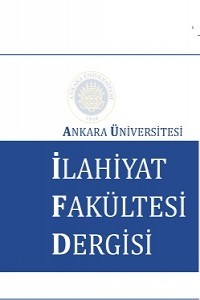“Mutlak Hakikat”in tecellîsi olarak dinlerin meşruiyeti: Frithjof Schuon’un gelenekselci mevzisine eleştirel bir bakış
Bu makalede Frithjof Schuon’un dinî çeşitlilik karşısında, “dinlerin aşkın birliği” diye tabir ettiği çoğulcu teorisi incelenmiştir. Schuon dinî çoğulculuğu, dinleri mutlak Hakikat’in tecellî ettiği semboller veya suretler sayan batınî ontolojik modele dayanarak savunmaktadır. Buna göre, bütün dinler, mutlak Hakikat’i belli coğrafî-kültürel şartlarla uyum içinde tezahür ettirip belli bir surette ifade etmek bakımından eşit hükümdedir. Bütün dinlerin ilahî inayetçe belirlenmiş yayılma alanları vardır, hepsi religio perennis (perenniyal din) denilen ortak bir özün örnekleridir. Tanrı bütün insanların tanrısı olduğu halde, bugüne kadar hiçbir dinin bütün insanlarca benimsenmemiş olması, hiçbir dinin yegâne hak din sayılamayacağını gösterir. Schuon’un mevzisinin kabul edilebilir olması, onun Tanrı ve dinler arasında kurduğu ontolojik ilişkinin açıklama gücüne bağlıdır. Oysa Tanrı ve dinler arasında kurulacak ontolojik ilişki, Schuon’un kendisinin de kabul edemediği sonuçlara götürmektedir. Ayrıca muhtelif dinlerin akidelerindeki farklılık, onların aynı türün farklı şartlarda ortaya çıkan örnekleri olarak görülmesini imkansız kılmaktadır
Anahtar Kelimeler:
Schuon, Bâtinî Ontoloji, Dinî Çoğulculuk, Mutlak Hakikat’in Tecellîsi
Legitimacy of Religions as Manisfestations of the “Absolute Truth”: A Critical Approach to Frithjof Schuon’s Traditionalist Position
Legitimacy of Religions as Manisfestations of the “Absolute Truth”: A Critical Approach to Frithjof Schuon’s Traditionalist Position In this article, I have discussed Frithjof Schuon’s pluralistic model, which is called the “transcendent unity of religions,” developed to interpret religious diversity. Schuon postulates his esoteric ontology which considers religions as symbols or forms manifesting the absolute Truth. According to this ontology, all religions are at equal stance vis à vis the absolute Truth since they are all forms manifesting the absolute Truth according to their geographicalcultural conditions. Particular religions contain and exemplify the religio perennis, which is the essence of all particular religions. Given that God is the god of all humanity and that no particular religion has ever been accepted by all humanity so far, no particular religion can claim exclusive right to be the only true religion. The success of Schuon’s esoteric ontological model depends on its power to explain human experience. However, Schuon himself cannot refrain from violating the implications of his theory. Furthermore, differences between creeds of diverse religions make it impossible to consider religions as members of the same species
___
- Aquinas, Thomas. Summa Theologiae: Latin Text and English Translation, Introductions, Notes, Appendices, and Glossaries. Ed. Thomas Gilby. New York: McGraw-Hill, 1964– 1980.
- Gonzalez, Justo L. A History of Christian Thought, c.1: From the Beginnings to the Council of Chalcedon. Nashville, TN: Abingdon Press, 1987.
- Hick, John. An Interpretation of Religion. Londra: Macmillan; New Haven, CT: Yale University Press, 1989.
- İbn Sīnā. Eş-Şifā : el-İlāhiyyāt. I-II. Nşr. El-Eb Ḳanavātī & Sa īd Zāyid. Kahire: el-Hey etu’l- Āmme li-Şu ūni’l-Meṭābi i’l-Emīriyye, 1960.
- Kelly, J. N. D. Early Christian Doctrines. New York, NY: HarperCollins, 1978.
- Knitter, Paul F. No Other Name? A Critical Study of Christian Attitudes Towards the World Religions. Londra: SCM Press, 1985.
- Lidsey, James E. The Bigger Bang. Cambridge: Cambridge University Press, 2000.
- Pelikan, Jaroslav. The Christian Tradition: A History of the Development of Doctrine, c.1: The Emergence of the Catholic Tradition (100-600). Chicago & Londra: University of Chicago Press, 1971.
- Race, Alan. Christians and Religious Pluralism: Patterns in the Christian Theology of Religions. Maryknoll, NY: Orbis Books, 1983.
- Schuon, Frithjof. Christianity/Islam: Perspectives on Esoteric Ecumenism: A New Translation with Selected Letters. Ed. James S. Cutsinger. Terc. Mark Perry, Jean-Pierre Lafouge & James S. Cutsinger. Bloomington, IN: World Wisdom, 2008.
- ----------. Form and Substance in the Religions. Terc. Mark Perry & Jean-Pierre LaFouge. Bloomington, IN: World Wisdom, 2002.
- ----------. Gnosis: Divine Wisdom. Terc. Mark Perry, Jean-Pierre Lafouge & James S. Cutsinger. Bloomington, IN: World Wisdom, 2006.
- ----------. Light on the Ancient Worlds. Terc. Deborah Casey ve diğerleri. Bloomington, IN: World Wisdom, 2006.
- ----------. Logic and Transcendence: A New Translation with Selected Letters. Ed. James S. Cutsinger. Terc. Mark Perry, Jean-Pierre Lafouge & James S. Cutsinger. Bloomington, IN: World Wisdom, 2009.
- ----------. Roots of the Human Condition. Bloomington, IN: World Wisdom Books, 1991.
- ----------. The Transcendent Unity of Religions. Wheaton, IL: The Theosophical Publishing House, 1993. Silk, Joseph. Evrenin Kısa Tarihi. Çev. Murat Alev. Ankara: Tübitak, 1997.
- Thomas, Owen C. (ed.). Attitudes Toward Other Religions: Some Christian Interpretations. New York, NY & Londra: Harper and Row, 1969.
- Weinberg, Steven. İlk Üç Dakika. Çev. Zeki Aydın & Zeki Aslan. Ankara: Tübitak, 2002.
- ISSN: 1301-0522
- Yayın Aralığı: Yılda 2 Sayı
- Başlangıç: 1952
- Yayıncı: ANKARA ÜNİVERSİTESİ > İLAHİYAT FAKÜLTESİ
